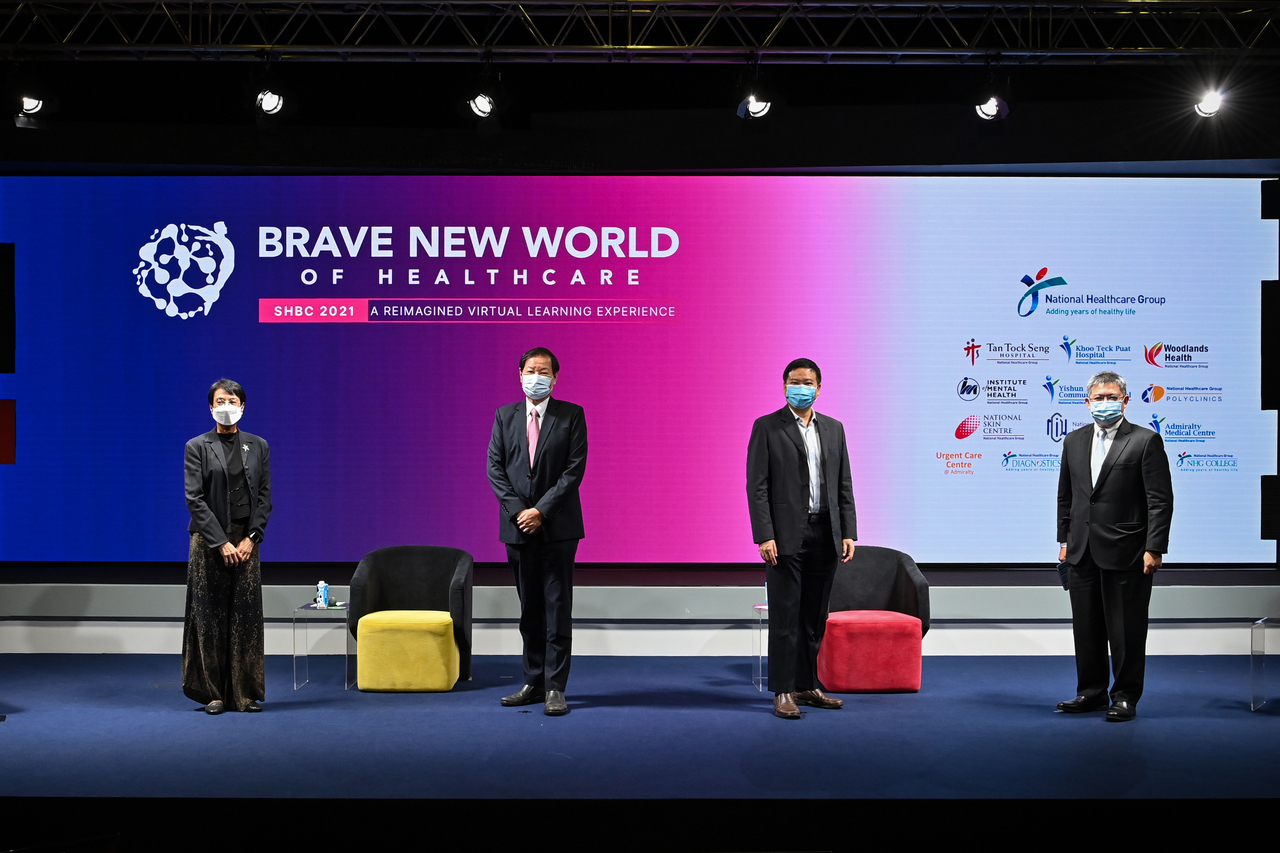Shift towards digital healthcare system inevitable in Singapore, says expert panel
Sign up now: Get ST's newsletters delivered to your inbox

(From left) Ms Salma Khalik, Professor Philip Choo, Associate Professor Jeremy Lim and Associate Professor Kenneth Mak during the 19th Singapore Health and Biomedical Congress 2021 at Singapore Expo on Oct 7, 2021.
ST PHOTO: LIM YAOHUI
SINGAPORE - From patients having an ailment managed through the mobile phone to having their health information kept online, the shift towards a digital healthcare system is inevitable.
Healthcare experts made the point on Thursday (Oct 7), adding that the change has been further cemented by the Covid-19 pandemic.
Speaking at this year's Singapore Health & Biomedical Congress organised by the National Healthcare Group, the experts said that the move towards digitalisation also means patients will have to increasingly manage their own health.
The three healthcare experts were speaking at Max Atria @ Singapore Expo during a morning panel discussion moderated by Straits Times senior health correspondent Salma Khalik.
In his opening address, Professor Philip Choo, group chief executive of the National Healthcare Group, said that technology in healthcare is used to maximise manpower or replace it; improve the experience of patients; and now, to also allow future patient populations to make good decisions.
"Technology is expensive, but manpower is even more expensive," added Prof Choo.
However, he said the key to a sustainable healthcare system in the country is for Singaporeans to own their own health.
The country is currently battling a wave of Covid-19 infections that is putting pressure on the healthcare system.
As at Oct 6, 1,520 patients with the virus were warded across hospitals here.
With more than 80 per cent of the population fully vaccinated against the coronavirus, home recovery has been the default arrangement as most infected patients now have mild symptoms or are asymptomatic.
There has, however, been confusion on the ground over the programme, which was officially rolled out on Sept 18.
Singapore's director of medical services Kenneth Mak said: "We are moving progressively from the Government doing everything to the importance of self-accountability, self-responsibility, self-obligation and so on."
He added that self-testing using antigen rapid test kits will become the norm as Singapore moves away from polymerase chain reaction tests, which are more intrusive and take more time to produce results.
Associate Professor Mak also echoed a point that other panellists made about the growing focus on technology in healthcare here, such as the use of telehealth.
Telehealth refers to the use of telecommunications technologies to provide care and services from a distance.
"Covid-19 is here to stay... It will have that permanent niche among all other illnesses and diseases that we face.
"The reality, moving forward, is that there will be still some level of restrictions to access care physically on healthcare campuses," said Prof Mak.
The restrictions include safe management measures, which will continue to be in place even when more activities are resumed. There will also be testing and some level of isolation, he added.
Associate Professor Jeremy Lim stressed that technology should fundamentally be about caring for patients better.

Associate Professor Jeremy Lim, Director, LIGHT, Saw Swee Hock School of Public Health, National University of Singapore.
ST PHOTO: LIM YAOHUI
"It's not just for the patients under your direct care, but freeing up your resources so that you can care for more patients," said Prof Lim, director of the Leadership Institute for Global Health Transformation at the National University of Singapore Saw Swee Hock School of Public Health.
"The patients in your clinic may get fantastic care, but the hundreds and thousands of patients that you don't see in your clinic are also citizens, they are residents of Singapore, and they deserve better care," he said, adding that healthcare will always be a "people business".
During the discussion, the experts also acknowledged the contributions of healthcare staff, who have been stretched thin amid the current wave of Covid-19 infections.
Prof Lim said that Singapore's Covid-19-related deaths per million population is extremely low, though more Covid-19 deaths are inevitable.
Both he and Prof Mak said that while Covid-19 had taken up hospital capacity in 2020, with elective surgery postponed for instance, it did not lead to higher rates of deaths here last year.
Prof Lim added that Singapore is one of the few countries not witnessing a measurable increase in excess mortality, which is the difference in the number of deaths in a crisis compared with the expected deaths in normal times.
Mr Masagos Zulkifli, Minister for Social and Family Development and Second Minister for Health, delivered the opening address at the event.

Mr Masagos Zulkiflli delivered the opening address at the event.
ST PHOTO: LIM YAOHUI
He said the pandemic has taught Singapore two lessons as it moves towards Covid-19 resilience.
"First, that the resilience of a country's healthcare system is key to its success in containing the virus; and second, pandemics are fought not only at the front lines of our healthcare systems, but also on the social front."
"Whether countries succeeded depended on how robust their social systems were, and how much people trusted their governments," he added.
To tackle the challenges beyond Covid-19, Singapore must also continue to transform its healthcare systems, strengthen social-health integration and address health problems upstream, said Mr Masagos, who spoke via a virtual feed.
Addressing Singapore's digitalisation of its healthcare system, he said telehealth consultations will become a "definitive feature of our care delivery, complementing traditional face-to-face medical consultations".
The congress includes two "live" panel sessions with speakers at Max Atria @ Singapore Expo discussing issues with experts attending virtually.


